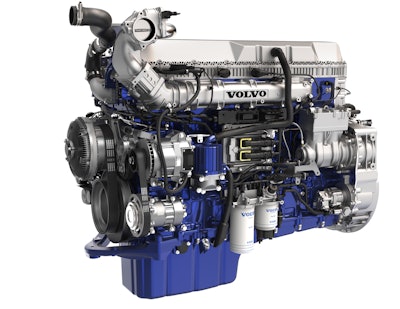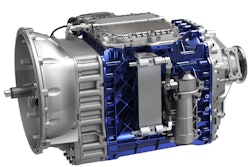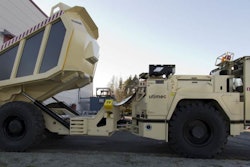
Volvo Trucks North America has introduced its model year 2017 Volvo engines, delivering increased power, performance and fuel efficiency to benefit customers. Volvo incorporated multiple engine improvements to extend fuel efficiency benefits, including enhancements to the Volvo D11 and D13 engines, as well as the development of the Volvo D13 with turbo compounding. As a result of the improvements, Volvo is delivering between 2.2-6.5% better fuel efficiency with the 2017 engines compared with previous generation power.
“Volvo’s 2017 lineup of engines is the most fuel-efficient we’ve ever offered in North America,” says Göran Nyberg, President of Volvo Trucks North America. “Volvo engineered multiple engine enhancements to provide customers with the needed fuel savings without sacrificing power and performance.”
The Volvo D13 with turbo compounding was designed for customers in long-haul applications. Turbo compounding is a technology that recovers wasted exhaust heat and converts it to useable mechanical energy in the form of 50 additional horsepower that is transferred back into the engine. This results in up to a 6.5% improvement in fuel efficiency compared with previous engine models.
The D13 with turbo compounding can also be spec’d with Volvo’s XE – eXceptional Efficiency – powertrain packages or in super direct drive. Through downspeeding, XE allows the engine to cruise at up to 300 rpm less than the average truck sold today – significantly improving fuel efficiency. The D13 with turbo compounding is available on an XE driveline with a 2.47 rear axle ratio.
In addition to the new D13 with turbo compounding, Volvo also updated its 11-L D11 and standard 13-L D13, already two of the industry’s most fuel-efficient engines. Designed to be even more reliable, the engines feature a proven common-rail fuel system for reduced engine and cab noise, providing drivers a more comfortable ride. The common-rail fuel system also contributes to fuel efficiency improvements through finer control of the fuel injection, allowing for quicker, more accurate injection and a more efficient way to control fuel pressure.
An updated EGR flow sensor has a new double-wall casing that reduces condensation and soot buildup in cold weather, preventing downtime. A low-pressure fuel system features an improved aftertreatment dosing module that is integrated into the fuel filter housing for easier serviceability. Upgrades to the two-speed coolant pump for both engines also improve fuel efficiency as a result of reduced parasitic losses. The new intake throttle enables a faster warmup when the engine is started.
The 2017 Volvo D11 offers up to 425 hp and 1,550 lbs.-ft. of torque, an increase of 20 hp. The engine also delivers up to a 2.2% fuel efficiency improvement compared with the previous D11 engine. With the right blend of power and a lighter weight, the D11 is ideal for regional, less than truckload (LTL) and pickup-and-delivery applications. The D11 is available in Volvo VN daycabs, VNM 430 and VNL 430 sleeper models, VAH and VHD models.
The 2017 Volvo D13 features a new wave piston, which increases the compression ratio and maximizes fuel efficiency. Improved flame propagation reduces soot, while also increasing cylinder efficiency. The updated D13, available in the Volvo VN, VHD and VAH models, offers a fuel efficiency improvement of up to 2.5% compared to the previous D13. These engine enhancements were also included in the 2017 Volvo D13 with turbo compounding.
The 16-L Volvo D16, the largest engine in its class, offers power and reliability for hauling heavy loads, with horsepower ranging from 500-600, with 1,650-2,050 lbs.-ft. of torque. Available in the VNL and VNX models, the D16 is the perfect choice for line-haul and heavy-haul operations.

















